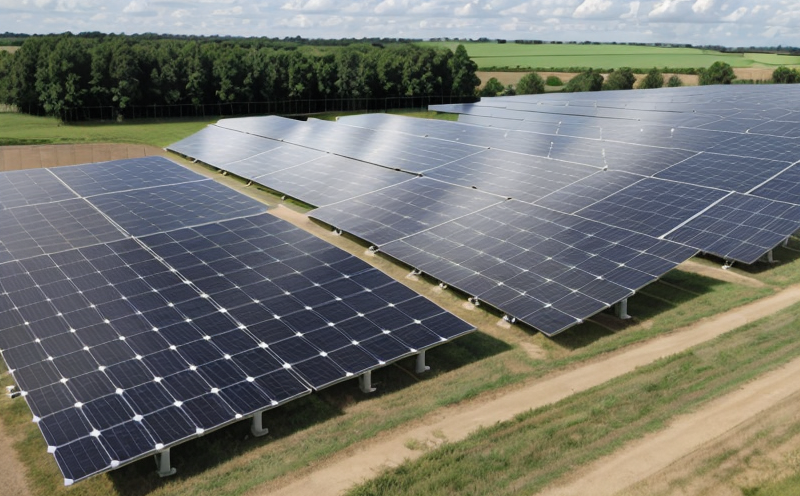IEEE 929 PV Inverter Compliance Testing in Renewable Grids
The IEEE Standard 929-1985 (reaffirmed 2003) for the evaluation of power quality by harmonic measurements provides a framework for ensuring that photovoltaic (PV) inverters comply with stringent standards in renewable grids. This service ensures that PV inverters meet critical requirements, enhancing reliability and safety within the grid infrastructure.
Compliance testing under IEEE 929 is essential to verify that PV inverters are capable of operating effectively without causing significant distortions or disturbances on the power supply network. The test involves a series of harmonic and interharmonic measurements designed to assess how the inverter reacts to various waveform conditions, ensuring compatibility with existing grid infrastructure.
The testing process typically begins by connecting the PV inverter to a controlled test environment where it is subjected to predefined harmonic inputs. This setup allows for precise monitoring of the inverter's response, focusing on its ability to maintain stable output voltage and current within specified limits. The test setup also includes simulation of real-world conditions such as grid disturbances, which are crucial for assessing the robustness and reliability of the PV system.
Once connected, the inverter undergoes a rigorous series of tests designed to evaluate its performance under various conditions. These include:
- Harmonic Injection Tests: Involves injecting harmonic currents into the inverter’s output and measuring the resulting voltages at the point of common coupling (PCC).
- Interharmonic Measurement: Evaluates the presence and magnitude of interharmonics, which are typically present in power systems due to nonlinear loads.
- Sag/Swing Tests: Simulates voltage sags and swells to assess the inverter's ability to maintain operation during grid disturbances.
- Frequency Range Tests: Ensures that the inverter operates correctly across a wide range of frequencies, including those experienced under normal operating conditions.
The testing apparatus used includes advanced measurement instruments capable of capturing detailed waveforms and harmonic data. These measurements are compared against IEEE 929-1985 standards to ensure that the PV inverter meets all specified performance criteria. The results provide a comprehensive evaluation of the inverter’s compliance with grid requirements, ensuring safe and efficient operation within renewable energy systems.
The importance of this testing cannot be overstated, as it directly impacts the reliability and stability of the entire renewable grid system. By adhering to IEEE 929 standards, PV inverters contribute significantly to reducing harmonic distortion on the grid, which can otherwise lead to increased losses and degradation in power quality.
Failure to meet these compliance requirements could result in operational disruptions, reduced efficiency, and potential damage to other components within the grid. Ensuring that all PV inverters comply with IEEE 929 standards is thus a critical step towards maintaining the integrity of renewable energy systems.
Why It Matters
The significance of IEEE 929 PV inverter compliance testing extends beyond mere certification; it represents a cornerstone of modern renewable energy systems. By ensuring that inverters meet stringent harmonic and interharmonic standards, this service plays a pivotal role in enhancing the overall performance and longevity of renewable energy installations.
Compliance with IEEE 929 is crucial for several reasons:
- Enhanced Grid Stability: Ensures that inverters do not introduce excessive harmonic content into the grid, thereby maintaining stable voltage and current levels.
- Avoidance of Interference: Prevents interference with other components on the grid by ensuring compatibility and minimizing electromagnetic disturbances.
- Increased Efficiency: By operating within specified limits, inverters contribute to higher overall system efficiency, reducing energy losses.
- Prolonged Equipment Lifespan: Properly tested inverters are less likely to experience premature failure due to excessive stress from non-compliant operation conditions.
- Compliance with Regulations: Ensures that all components meet regulatory requirements, avoiding potential legal and financial penalties.
In summary, IEEE 929 compliance testing is not just a technical requirement but an essential practice for maintaining the integrity of renewable energy systems. It ensures that each component operates reliably and efficiently within the grid, contributing to a more sustainable and resilient power supply infrastructure.
Industry Applications
The IEEE 929 PV inverter compliance testing is particularly relevant for various sectors involved in renewable energy systems. Some of these applications include:
- Solar Power Plants: Ensures that inverters function correctly within large-scale solar farms, contributing to their efficient operation and reliability.
- Distributed Generation Systems: Supports the integration of small-scale renewable energy systems into existing grid infrastructure without causing disturbances.
- Commercial & Industrial Facilities: Enhances the performance of on-site PV installations by ensuring that inverters meet stringent harmonic and interharmonic standards.
- Residential Solar Installations: Provides peace of mind for homeowners, ensuring that their systems operate safely and efficiently within local grids.
In addition to these applications, the testing is also beneficial in research and development environments where new technologies are being evaluated. By adhering to IEEE 929 standards, developers can ensure that their innovations meet industry benchmarks, facilitating smoother integration into existing grid systems.
Eurolab Advantages
At Eurolab, we pride ourselves on offering comprehensive and reliable IEEE 929 PV inverter compliance testing services. Our expertise and state-of-the-art facilities ensure that every test is conducted to the highest standards, providing you with accurate and actionable results.
- Expertise: Our team of experienced engineers has extensive knowledge in renewable energy systems, enabling them to provide precise testing and analysis.
- Advanced Equipment: Utilizing cutting-edge measurement instruments ensures that all tests are conducted with the utmost accuracy, capturing even subtle variations in performance.
- Certification: Our services meet or exceed industry standards, providing you with certification that your PV inverters comply with IEEE 929 requirements.
- Rapid Turnaround: We understand the importance of timely results and strive to deliver reports within specified deadlines, allowing for quick decision-making processes.
- Comprehensive Reporting: Every test comes with detailed documentation and recommendations, helping you identify areas for improvement and optimize your systems further.
We are committed to supporting our clients in meeting their compliance needs while ensuring the highest level of quality in every service we provide. Contact us today to learn more about how Eurolab can assist you in achieving IEEE 929 compliance for your PV inverters.





